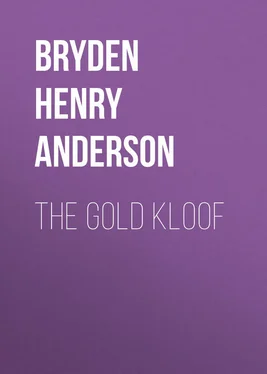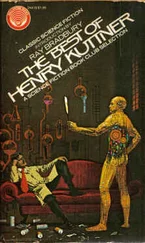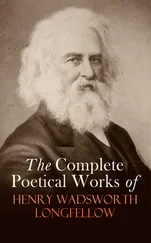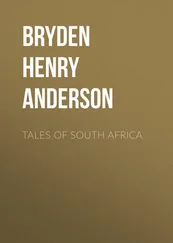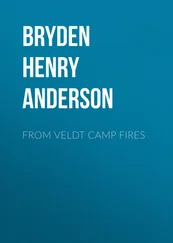Henry Bryden - The Gold Kloof
Здесь есть возможность читать онлайн «Henry Bryden - The Gold Kloof» — ознакомительный отрывок электронной книги совершенно бесплатно, а после прочтения отрывка купить полную версию. В некоторых случаях можно слушать аудио, скачать через торрент в формате fb2 и присутствует краткое содержание. Жанр: foreign_prose, foreign_antique, foreign_language, на английском языке. Описание произведения, (предисловие) а так же отзывы посетителей доступны на портале библиотеки ЛибКат.
- Название:The Gold Kloof
- Автор:
- Жанр:
- Год:неизвестен
- ISBN:нет данных
- Рейтинг книги:4 / 5. Голосов: 1
-
Избранное:Добавить в избранное
- Отзывы:
-
Ваша оценка:
- 80
- 1
- 2
- 3
- 4
- 5
The Gold Kloof: краткое содержание, описание и аннотация
Предлагаем к чтению аннотацию, описание, краткое содержание или предисловие (зависит от того, что написал сам автор книги «The Gold Kloof»). Если вы не нашли необходимую информацию о книге — напишите в комментариях, мы постараемся отыскать её.
The Gold Kloof — читать онлайн ознакомительный отрывок
Ниже представлен текст книги, разбитый по страницам. Система сохранения места последней прочитанной страницы, позволяет с удобством читать онлайн бесплатно книгу «The Gold Kloof», без необходимости каждый раз заново искать на чём Вы остановились. Поставьте закладку, и сможете в любой момент перейти на страницу, на которой закончили чтение.
Интервал:
Закладка:
"Well done, Guy!" said his uncle approvingly. "Nothing like picking up these things as soon as possible. You'll do, I can see. Once a man learns how to knee-halter a nag, he never forgets it. It's like running or skating, or riding or dancing-once mastered, never forgotten."
The horses were given a feed of forage, which consists of the ears and stalks of oats cut up and eaten together-"oat-hay" some people call it-and then grazed for half an hour in the long grass veldt. The sun was becoming hot, and the travellers now doffed their coats and went, as most people do up-country, in their shirt sleeves.
Presently they inspanned again and drove off. Now they were approaching a belt of charming forest country, low, spreading, umbrella-shaped giraffe-acacia timber, planted by nature not too thickly together. Everywhere among these trees grew the tall, pale, yellow veldt grass, and pleasant vistas and open glades here and there greeted the eye. Amid these trees fluttered occasionally queer, bizarre-looking hornbills, and brilliant rollers, miscalled "blue-jays" by the colonists, blazing in lovely plumage of many hues-blues, lilacs, purples, and greens. For an hour they drove through this pleasant country, and then emerged upon the dry, rolling grass plains once more. Half an hour later they approached a small shallow valley, through which ran the dry bed of a periodical stream. Along the banks of this dry stream grew a fringe of thorn bush, the common doom boom, or thorny acacia. Suddenly Mr. Blakeney pulled up his team.
"Sh!" he said in a low tone, handing the reins to Guy, and reaching out the Mannlicher, which now stood against the seat behind him. "Follow the line of bush yonder," he continued, pointing with his right hand. "Do you see anything?"
"Yes," replied Guy; "I see a big bird. What is it?"
"That's a paauw, my boy," answered his uncle; "our biggest bustard. You must have a try for him."
Taking some cartridges from a bandolier that hung at the side of the cart, Mr. Blakeney filled the magazine clip and pushed it into its place. Then he worked a cartridge into the breech.
"Now, Guy," he went on, "jump down there, creep up behind that bush, and try for a shot. You know the mechanism. If you miss with the first, have a blaze with your second cartridge. You won't get nearer than a hundred yards. Take your time, and don't hurry your shot."
Guy slipped down quietly, and, stooping low, crept towards the bush his uncle had pointed out. The paauw still fed quietly along the spruit: it was some two hundred and fifty yards from the cart, and the cunning creature, judging the distance to a nicety, esteemed itself quite secure. But, meanwhile, the eager lad with the Mannlicher was creeping up, the wind was right, and it seemed that he might attain his vantage-ground without the alert bird becoming aware of him. Now he is within forty yards of the bush, now thirty, now ten. He is there. Cautiously peering through the leafy screen, and dropping on to his right knee, he takes steady aim and fires.
The report of the Mannlicher was a light one, and its smoke very trifling. The big bird staggered to the shot, half lifted its wings, ran fifteen paces, and then dropped to the veldt dead. A shout of triumph rang out from Mr. Blakeney's lips.
"Bravo! bravo! my boy," he cried in stentorian tones. "You've done the trick beautifully."
Long before the words were out of his uncle's mouth, Guy, scarcely able to contain his exultation at this his first success, threw his hat into the air, leaped out of the bush, and ran like a deer up to the dead bustard. He picked it up-it seemed enormously heavy-and held it up in triumph. Then turning he walked swiftly back towards the cart. His uncle met him at the bush, clapped him on the back, and said heartily, -
"Well hit, Guy! A first-rate shot. I can see you don't want much coaching in the art of rifle-shooting. It isn't every day we get a paauw."
He took the great bird from the lad, and, holding it out, tested its weight. "He's a beauty," he went on; "fat, and in high condition. Can't weigh less than thirty pounds. Handsome bird, isn't he? Look at his crest. That's the biggest and finest bustard in the world- kori the Bechuanas call him.
"Now let us pace the distance," he continued.
They paced it from the bush to the spot where the bird had been hit. Just one hundred and five yards it was, at a rough computation.
"A good shot, Guy," repeated his uncle. "And you kept your head and didn't hurry it. Well, we shall dine excellently. Your aunt and cousins will be as pleased as Punch to see that paauw; it's by far the best eating of any game-bird in Africa."
They reached the cart again. Peetsi, with beaming face, exclaimed in smooth Bechuana at the kori, and fastened the great bird up at the back of the cart, under the shade of the hood. Then they resumed their journey. Half an hour farther on, Mr. Blakeney got down from the cart, shot-gun in hand this time. He had noticed a koorhaan, one of the lesser bustards, go down at a certain spot in the veldt on the left-hand side of the road. In approaching the place where the bird lay concealed, he executed a circling movement. Smaller and smaller became the circle, and then, suddenly, without a cry of warning, a biggish bird flushed from the long grass and flew off. In an instant the sportsman's gun was at his shoulder. Then came the crisp report of a Schultz cartridge, and the bird instantly fell to the shot. Mr. Blakeney walked forward to pick it up. As he did so a second bird, the hen, rose almost from under his feet. Giving her twenty-five yards law, again the gunner pulled the trigger, and the second game-bird hit the earth. It was a pretty scene-the wide yellow plain; the gunner standing knee deep in grass; the stricken bird, outlined clear against the hot sky. Giving the reins to Peetsi once more, Guy sprang out of the cart and ran to meet his uncle.
"Well, that was a pretty bit of shooting, uncle!" he cried joyfully. "I'm glad I saw it. I shall know what to do when I see a koorhaan go down and squat as that one did."
"That's a blue-necked koorhaan," answered his uncle; "one of our most beautiful bustards. Look at its lovely colouring and plumage-the bright rufous back, marked with black; the bluish tinge on the neck; and the tints, rufous, ash-colour, white and black, of the head and neck. And how splendidly the black wing feathers and the white underparts contrast with the rest of the plumage."
Guy took the two birds, which were each about the size of a blackcock, and walked with his uncle back to the cart. They drove on now, with a couple more outspans to rest the horses, until at length, turning a corner of some bush, Mr. Blakeney suddenly pointed with his whip and said, "There's Bamborough!"
Guy looked, and saw at the top of a gentle slope, which rose above a well-bushed river valley, a long, low, square-built house, having a raised veranda, or stoep as it is called in South Africa, running all round it. In a mile they had crossed the dry river-bed, ascended the slope, and driven up to the place. It was just upon two o'clock. Mrs. Blakeney, a pleasant, comely-looking matron, came out of the house, and greeted her nephew so soon as he descended. She had not seen him since he was a small child.
"Of course, I should not have known you, Guy," she said. "What a giant you have grown! I shall be very proud of my good-looking nephew."
Then the cousins had to be introduced-Tom, the eldest boy, a fine-looking lad of eighteen, like his father, lean, dark, and wiry; two pretty, fresh-looking girls of fifteen and thirteen, Ella and Marjory; and Arthur, the youngest of the group, a sharp-looking boy of eleven. The greetings over, Mrs. Blakeney took them at once into dinner, which she had kept back, trusting to her husband's invariable speed and punctuality, even on a forty-mile drive.
Читать дальшеИнтервал:
Закладка:
Похожие книги на «The Gold Kloof»
Представляем Вашему вниманию похожие книги на «The Gold Kloof» списком для выбора. Мы отобрали схожую по названию и смыслу литературу в надежде предоставить читателям больше вариантов отыскать новые, интересные, ещё непрочитанные произведения.
Обсуждение, отзывы о книге «The Gold Kloof» и просто собственные мнения читателей. Оставьте ваши комментарии, напишите, что Вы думаете о произведении, его смысле или главных героях. Укажите что конкретно понравилось, а что нет, и почему Вы так считаете.
